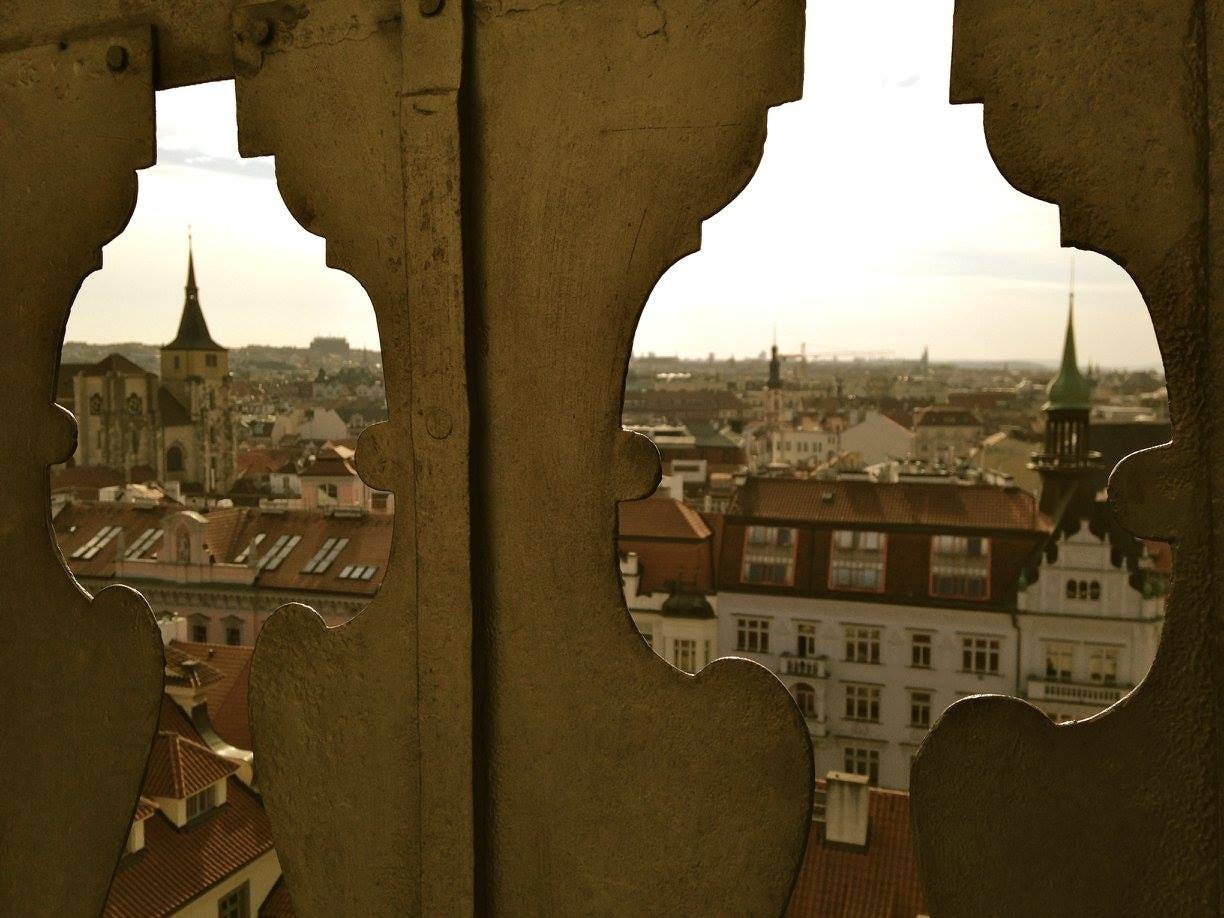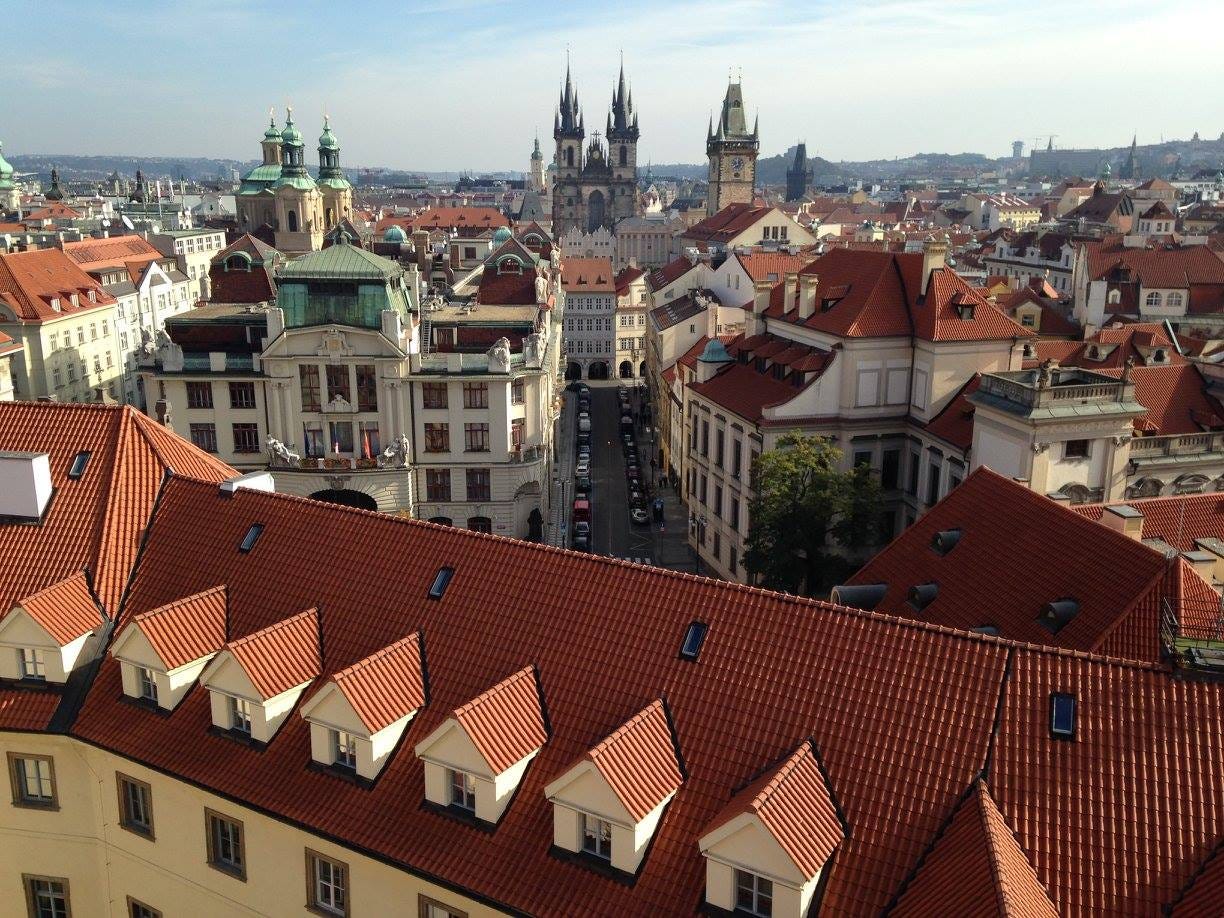A MAN WITH A STAR IN A GARRET
The late Czech writerJiři Weil writes about the life of a Jewish man who is in hiding during the holocaust. It's laugh-out-loud funny at times, even when the man is roiling in despair.

“I had burned the bed and the wardrobe. I had burned everything I could because I had no coal and because I didn't want to give them anything. They would not get anything from me, not even the old socks I used to seal the windows and doors, or the curtains that I used as rags to clean the floor, or the furniture that had already been swallowed up by the stove. I didn't yet know what to do with the mattress. I had to sleep on something. . . . I intended to burn the mattress as soon as they tried to do something with me. . . . When they came to confiscate the furniture they would find nothing but cracked walls, an empty garret, the broken-down stove, and, in the middle of the room, the coffee table; this useless piece of furniture would reign over the room. . . . ''
Born near Prague in 1900, Jiři Weil—not unlike Stefan Zweig and Milan Kundera—wrote under the constant shadow of government scrutiny and disapproval. Upon the publication of his first novel written in the mid-30's, Jiři Weil was expelled from the Communist Party because he had painted such a bleak portrait of Stalinism. Subsequently, Weil was also cast off by the Writers' Union. Another of his books, The Wooden Spoon, was translated into Italian and printed in Italy 30 years after he wrote it. Only two of this Czech writer‘s novels have been translated into English.
Life With a Star, considered his major work, was denounced for its ''pernicious existentialism'', and in the introduction to this work, the late Philip Roth extolled Weil’s articulation despite the misery of the times: “I read them and was stunned, not solely by the horrors they described but by the elemental means that served to communicate Weil’s hatred for the Nazis and pity for their victims. They were stories conceived in rage and tears, then told with the matter-of-factness of the journalist and the disarming simplicity of the family anecdotalist.“
On 16 October 1941, the first mass transport of Jews left Prague for the ghetto in Łódź; soon transports departed on a regular basis to the newly established ghetto in Terezín and from there to other ghettos and extermination camps. Local inhabitants saw families dragging heavy suitcases containing personal belongings being marched to the station. Today, Střešovice is supposedly a nice neighborhood in the west of Prague—the "local Beverly Hills", home to some famous residents, including Czech President Václav Havel—which, at the time of the second world war, was a place of humiliation and terror.
The protagonist of Life With a Star, Josef Roubicek, dreads his mandatory visits to Střešovice. He is a bank clerk, and single, although he keeps recalling his pre-war affair with slim, elegant Ruzena, the wife of a friend’s friend. Ruzena wanted him to run away with her, run as far away from Prague as they possibly could and eke out a life together but Josef was afraid that they would starve and suffer wherever they managed to find a life.
While reading Life With a Star, I was reminded of Andrei Kurkov’s Grey Bees because it depicted the state of a man living in solitude in dire circumstances. The supplies won’t last and it’s getting colder. What must the man do? While the protagonist of Kurkov’s novel has a “frenemy” to talk to, a neighbor with whom he has never had a civil relationship, Roubicek has no one at all. He must talk to a now imaginary lover Ruzena to survive.
I didn’t understand Ruzena, and I didn’t want to understand her. I didn’t want to go away, although I myself didn’t know what to do. We loved each other but we always had to meet in secret. It was difficult, the constant deceit, lies, evasions. It wasn’t the right way to live—because we did love each other.
“Let’s not talk about it anymore. But someday you’ll be sorry!’
I was afraid then. I thought Ruzena wanted to leave me. She understood me.
“No, I don’t want to leave you, but what if I have to…”
But then she kissed me and we forgot everything. We went downtown through winding alleys. We stopped often to kiss; we stopped kissing only when we came to well-lit streets.
In several rib-tickling passages we begin to see Josef Roubicek’s resilient spirit, his rich imagination and his self-deprecating humor, all of which seem to constantly well up from a bottomless pit. He has hidden himself away in a cold garret and has burned, literally, everything he possesses to keep the fires burning in the room but in his imaginary world, he’s in a plush car as the president of the bank in which he was a mere clerk until very recently.
Ruzena and I will sit on the thick upholstery of the car and I will casually give orders to the chauffeur. “Where are we going, Josef?” Ruzena will ask. “To the seashore, to France; we’ll go via Paris and you can buy everything you need there.”
But the fantasy was not a success. I could not imagine a rich Roubicek or the boulevards of Paris. I saw Stresovice and the beastly faces in uniforms. I tossed about in my sleeping bag for a long time before falling asleep.
We see Josef Roubicek’s wistfulness. His longings sustain him during the extreme penury and hardship in his real life. When he vanishes into his dreamlike stupor while thinking about Ruzena, his “Hunger”, spelt thus with an upper case “H”, seems to vanish, too. He doesn’t feel the snow falling on his head and the cold numbing his extremities.
I longed to be an animal. From the windows of the garret I saw dogs playing in the snow, I saw a cat creep slowly across the neighbor’s garden, I saw horses drinking freely from buckets, I saw sparrows flying about whenever they felt like it. Animals don’t have to rack their brains about which streets they are allowed to enter.
A stray cat, Tomas, begins to hang around his garret bringing Roubicek some solace, yet his plight is unbearable sometimes. There’s not a single moment, however, when the pathos of the situation makes him contemplate ending his life. It’s this upbeat tone to the whole tale that I found both unbelievable and illuminating. How do some humans have so much endurance that their physical responses to inclement weather or to the impossible demands of vindictive leaders do not destroy their spirit?
What seems to deflate Roubicek is the personal response of the people around him the day he walks about his neighborhood after stitching the yellow star on his coat. He is unprepared for what accosts him. He is both incredulous and hurt. It’s one of the most moving passages in the book; for the first time, his neighbors, who were once friendly, avoid looking at him or look right through him. It’s the branding by the yellow star that seems to pierce his heart.
I went out the next day. After all, I had to go shopping. I saw people looking at me. At first it seemed as though my shoelaces must be untied or that there was something wrong with my clothes. In some way I had upset the everyday, accepted order of things. I was a sort of blot that didn’t belong in the picture of the street and everyone seemed to be aware of this. And I was alone among other people, completely alone, because people would make way for me. They would stop and look at me. I was no longer one of them.
This is a difficult book to navigate but the author’s pen is so light that it doesn’t feel unending. Yet, it is often repetitive. Weil needs to convey the monotony of a lonely life and the friendlessness of this man. Yet the very act of conveying this can drain the reader. Tomas the cat does little to enliven the page. Despite these shortcomings, I can see why Roth was stunned by this work.
Jiři Weil’s writing is buoyant and incandescent, and in the most noxious moments of human suffering, he knows exactly what to say to drive the pen into the reader’s heart. There’s a protracted section in the novel where we watch how the names of those who will be packed into trains going east are called out. Everyone knows they are going to die and the tension in the dark room is heartbreaking.
The names dripped slowly. Out of the depths we cry to thee O Lord, from the depths of pain and despair. The Abeles went, the Askenazys, the Bendas, slowly the Anns, Maries, and Hedvigs followed, the Elizabeths and Josefines, the Josefs, Roberts, Egons, Jans and Pavels went by.
The room continues to resound with the names of those going to their doom and Josef Roubicek dreads his turn. Yet it never comes.
The Roubiceks would no longer walk, eat, sleep, make love to their wives if they had them. Only I, Josef Roubicek, would live for a time, perhaps half a year, perhaps a year, because someone had made a mistake in pulling the Roubiceks out of the file. I would never learn why I wasn’t read among the others, yet this nonsensical error, unbelievable and impossible, had given me this day.
Weil is apparently better known for another of his translated works, Mendelssohn is on the Roof , which deals with similar events—Jewish life in occupied Prague—and upon reading Life With A Star, I’m left wondering how the circumstances of his life eventually snuffed out both his positive spirit and his potential.
Philip Roth writes about how, long after the world war ended, Weil was made the director of the Jewish State Museum in Prague in the late fifties, and “had been readmitted to the Writers’ Union—but he is said to have lived a retiring, isolated, unhappy existence until his death from cancer in 1959.”



Bleak. And I’m sure Phillip Roth came along to recommend him after he was long dead. But what amazing fortitude to go on living and writing in the face of all that hatred.